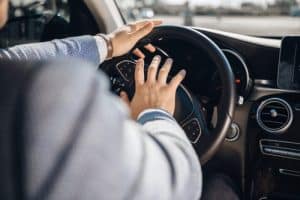Reckless drivers take driver negligence to entirely new levels. For example, the National Highway Traffic Safety Administration (NHTSA) reports that a full 26 percent of all traffic fatalities in 2019 involved excess speed. Speed is but one example of reckless driving, and other forms, such as running red lights, cause their own considerable damage. In fact, NPR reports that 939 people lost their lives in 2017 alone as a result of reckless drivers who sailed through red lights. When motorists engage in reckless driving practices, they are more likely to lose control of their vehicles, and they help to ensure that other motorists are hard-pressed to predict their behaviors (and the risk involved). Reckless drivers invariably make our roadways far more dangerous.
What’s In This Guide:
- What Is Reckless Driving and Types of Reckless Driving
- Penalties for Reckless Driving
- Avoiding Reckless Driving as a Driver
- How Do I Fight a Reckless Driving Ticket?
What Is Reckless Driving and Types of Reckless Driving
 Reckless driving in the state of Kentucky is defined as a breach of the state’s requirement that operators of vehicles drive carefully. Reckless drivers tend to put their own convenience and needs above the safety of others on the road. Sometimes, they simply take their own frustrations out behind the wheel, and in the process, they become aggressive drivers (who are among the most dangerous of all). Regardless of the reason behind a motorist’s recklessness, reckless driving is exceptionally dangerous and can take a wide range of forms.
Reckless driving in the state of Kentucky is defined as a breach of the state’s requirement that operators of vehicles drive carefully. Reckless drivers tend to put their own convenience and needs above the safety of others on the road. Sometimes, they simply take their own frustrations out behind the wheel, and in the process, they become aggressive drivers (who are among the most dangerous of all). Regardless of the reason behind a motorist’s recklessness, reckless driving is exceptionally dangerous and can take a wide range of forms.
Running Red Lights and Failing to Stop at Stop Signs
Traffic signs, lights, and signals are designed to facilitate the smooth flow of traffic over our roads and through busy intersections. Among the most important of these safety mechanisms are red lights and stop signs, which are critical to the safe passage of everyone on our roads. When motorists take these as suggestions – rather than as requirements – it throws our roads into chaos and can lead to life-threatening accidents.
We rely on stop signs and red lights to predictably guide the flow of traffic, but reckless drivers are anything but predictable. If you can’t rely upon other drivers to follow the rules of the road, it makes it that much more difficult for you to drive defensively and to get where you need to be safely – every single time. Rolling stops in which motorists drop their speed a bit – when they should come to a complete stop – are also a form of reckless driving that puts us all at increased risk.
Speeding
As mentioned, speeding is a deadly practice that not only increases the odds of an accident happening in the first place but also increases the odds that the accident will be fatal. When motorists speed excessively, they diminish their ability to accurately assess the dangers all around them, and they decrease the amount of time they have to safely react to said dangers. When a driver speeds excessively, he or she puts other motorists, pedestrians, cyclists, and construction workers at considerably greater risk of being seriously injured.
Tailgating
Tailgating is the practice of riding another car’s bumper, and it’s commonly associated with aggressive driving – and with rear-end collisions, which are not only far too common but are also immensely dangerous. Drivers often tailgate in an attempt to hurry the forward driver along, but doing so allows no buffer to react to any of the many hazards that can suddenly arise and require vehicles to slow down in response.
Zipping in and out of Lanes
When a motorist chooses to take matters into his or her own hands and to set a pace that far exceeds the speed limit, he or she may resort to zipping in and out of lanes (in order to accommodate his or her immense speed). This exceptionally dangerous brand of reckless driving makes changing lanes that much more dangerous for other drivers. In other words, drivers who choose to zip in and out of lanes turn a blind eye to the safety of everyone on the road.
Driving under the Influence of Distraction
Distraction has become a serious problem on our highways and byways. When someone behind the wheel is distracted by anything other than proceeding safely, danger is not far behind. When a motorist is distracted, he or she is less likely to notice potential dangers ahead, but distraction also leaves motorists less likely to pay adequate attention to others on the road (or to see them at all), including pedestrians, bicyclists, and motorcyclists. The most dangerous distraction of all is texting. In Fact, NHTSA shares that composing or reading a text takes an average of five seconds, and when the driver is traveling at highway speeds, this five seconds translates to removing one’s eyes from the road for about the length of a football field. The danger inherent to driving blind needs no further explanation. Smartphone usage, however, isn’t the only dangerous form of driver distraction. Consider the following:
- Paying more attention to one’s conversation with another passenger than to the road ahead
- Fiddling with the GPS, radio, or temperature controls
- Eating or drinking behind the meal (especially messy foods that require more careful attention)
- Grooming oneself behind the wheel, such as applying makeup
- Attempting to deal with paperwork of any kind, whether it’s kid, home, or work-related
- Engaging in any activity that pulls one’s attention away from the primary task at hand (driving safely)
Driving under the Influence
No one has to explain to you exactly how dangerous driving under the influence of alcohol and/or drugs can be. Drunk drivers can experience physical, cognitive, and even sensory impairments that make driving safely highly improbable. Common signs of impaired driving include speeding excessively, driving too slowly, and driving erratically in general. All told, impaired drivers are unpredictable drivers who put the lives of everyone with whom they share the road at increased risk.
Penalties for Reckless Driving
Drivers who are convicted of reckless driving in the State of Kentucky can face significant fines and penalties that include adding four points to one’s drivers’ license. When a driver accumulates a total of 12 or more points within a period of 2 years, it can lead to a driver’s license suspension.
The inconvenience and stigma associated with losing one’s driver’s license due to reckless driving are difficult to overstate. The intention behind the Kentucky Driver Point System is to identify those motorists who make a habit of driving negligently, but before your license is suspended, you will be given the opportunity to meet with a hearing officer (and probation – rather than suspension – is a possibility). While the points you acquire on your license expire two years from the date of your reckless driving conviction, the conviction itself will remain on your record for a full five years.
If you receive probation in lieu of a license suspension, you’ll be required to attend State Traffic School, which amounts to a driver improvement clinic. After receiving probation once, you won’t be considered for it again until at least two years have passed since your last probationary period ended.
Avoiding Reckless Driving as a Driver
When you buckle up behind the wheel, you obviously don’t intend to drive recklessly, but any number of variables can push even the best-intentioned among us to engage in suspect driving practices. Fortunately, there are some tips and techniques you can employ to help ensure that you stay safe out there (while remaining on the right side of the law).
Make a Plan
If you’re going to have a drink or two, you should also have a plan. This can mean designating a driver, hitching a ride on Uber or Lyft, or staying put for the night. Don’t put yourself in the dicey position of drinking too much and not having an alternative to driving tipsy.
Get Familiar with How Your Medications Affect You
Know how your medications affect you before you get behind the wheel. You don’t want any surprises, and medicines can affect people in vastly different ways. If yours leaves you drowsy, inattentive, or generally out of it, you shouldn’t drive, and knowing what you’re up against ahead of time, can help you make the right decisions for you moving forward. Pain medications and cold and flu aids are closely associated with negative consequences behind the wheel. When you add alcohol – even a glass or two – it can amplify the negative effects.
Allow Yourself Plenty of Time
When you fail to allow yourself ample time to get where you need to be, you greatly increase the chance that you will be tempted to engage in reckless driving practices, such as speeding, in an effort to buy time. By padding your itinerary to accommodate for unexpected delays, you help to ensure that you will remain cool, calm, and collected behind the wheel. This is also a great way to avoid road rage and aggressive driving practices generally – both of which can prove life-threatening. Obeying the speed limit (and adjusting your speed downward in response to bad weather, the effects of inadequate road maintenance, heavy traffic, or anything else) is the best way to steer clear of reckless driving practices and to help ensure that everyone in your vehicle arrives alive.
Let Other Drivers Know What You Plan on Doing
Unpredictable drivers are dangerous drivers, but when you let the motorists who share the road with you know what you plan on doing – such as by using your signals to demonstrate your intention to change lanes, take an exit, or do anything else – you significantly decrease the risk involved.
Put Down Your Phone
As discussed, distracted driving is simply too dangerous not to put your phone away when you get behind the wheel. This also applies to your smartwatch and to any other electronic gadgets – give them a well-deserved rest. Other distractions – whatever they may be – should be similarly shelved until you reach your destination (or take a break).
Keep Your Vehicle in Safe Working Order
Before you head out on the road, make sure your vehicle is road-worthy. This involves regular maintenance but also means walking around your vehicle and checking your tires and lights on a regular basis. Before you pull out of your driveway, situate your driver’s seat, adjust your mirrors, set your GPS, control your vehicle’s temperature, and do anything else you need to do to be comfortable – and safe.
Leave Plenty of Room Between You and Forward Drivers
You never know what will happen on the road ahead, and the only way to ensure that you can react safely to whatever comes your way is by allowing a buffer of two seconds or more (depending upon the situation) between you and the driver ahead of you.
How Do I Fight a Reckless Driving Ticket?
If you’ve been hit with a reckless driving ticket, a conviction can lead to serious consequences that are best avoided. If this is the situation you find yourself in, the most important step you can take is working closely with a traffic ticket attorney. The bottom line is that if you pay the ticket, it amounts to a clear admission of guilt – with all the fines and penalties that go along with it.
Just because you’ve been charged with reckless driving, however, does not mean that you are guilty of reckless driving, and bringing your strongest defense is paramount. Having a dedicated traffic ticket attorney in your corner can help in all the following ways:
- Your attorney will gather all the relevant evidence in an effort to build your solid defense.
- Your attorney will help you make the right decisions for you throughout the legal process (whether this means seeking probation or not).
- Your attorney will skillfully negotiate with the prosecution to help ensure that your case is resolved as favorably as possible.
Your case matters, so don’t put off reaching out to a seasoned Kentucky traffic ticket attorney today.

Schedule a Free Case Evaluation with a Bowling Green Car Accident Lawyer Today
If you have been injured by a reckless driver, there is a good chance that you are entitled to compensation under state law. At Flora Stuart Templeton Accident Injury Lawyers, we will review the facts of your case at no cost to you and determine whether you have a claim. If you do and choose us to represent you, we will never collect legal fees unless we win your case.
To schedule your free consultation, call our office today at (888) 782-9090 or contact us online.

